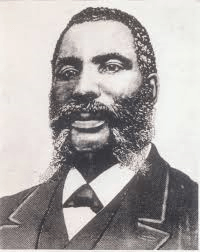Harvey Johnson (reverend) facts for kids
Quick facts for kids
Harvey Johnson
|
|
|---|---|
 |
|
| Born | August 4, 1843 |
| Died | January , 1923 |
| Occupation | Reverend |
| Known for | Civil rights activism |
| Spouse(s) | Amelia E. Johnson |
| Religion | Baptist |
Harvey Johnson (born August 4, 1843 – died January 1923) was an important African American leader. He was a pastor and activist. He led the Union Baptist Church for a long time. This was during the late 1800s and early 1900s.
Who Was Harvey Johnson?
Early Life and Education
Harvey Johnson was born in Fauquier County, Virginia. His parents, Harriet and Thomas Johnson, were held in slavery. They worked on a large farm. After they became free, his family moved to Alexandria, Virginia.
After the American Civil War, many black people moved to Alexandria. New groups and places were created for them. The Alfred Street Baptist Church was one important place for Harvey and his family.
Harvey went to college for four years. He graduated with honors in 1868. This was from Wayland Seminary in Washington, D.C.
Family Life
On April 17, 1877, Harvey Johnson married Amelia E. Hall. She was a writer. Amelia was born in Montreal, Canada, in 1868. Her family moved to Baltimore in 1874. She met Reverend Harvey Johnson there.
They got married a few years later. Harvey and Amelia had three children. They had two sons, Harvey Jr. and Prentiss. They also had a daughter named Jessie E. Harvey and Amelia were married until she passed away in 1922.
Leading a Church
Becoming a Minister
Harvey Johnson was always very involved in church as he grew up. He decided he wanted to become a minister. After college, he started teaching about the ministry.
In 1872, the leader of the Baltimore Union Church passed away. Harvey Johnson then became the new head pastor. He was 29 years old.
Growing the Union Baptist Church
When Harvey Johnson became pastor, the church had about 250 members. During his time, it grew to over 2,200 members! He served the church for fifty years. He stayed there until he died in January 1923. His long leadership was very important for Baltimore.
Working for Equality
Helping the Black Community
Reverend Johnson worked hard for both spiritual growth and civil rights. He wanted black ministers to be paid fairly. He also wanted more black people in Baptist churches. He helped create many unions between different churches to achieve this.
Johnson fought against unfair treatment. He believed black churches should be independent. This meant they should manage their own money. He encouraged black churches to break away from white financial control. He also urged them to leave the Union Association.
Protecting Civil Rights
In the 1880s, Harvey Johnson became a key leader for African American civil rights. This was a time when many civil rights protections were being lost. Some black people went to court to fight for their rights.
In 1885, Johnson gathered five other Baptist leaders. One of them was J.C. Allen. Johnson called this meeting to stop unfair treatment. They talked about the time after the Civil War. This led to a new civil rights group. It was called the Mutual United Brotherhood of Liberty of the United States (MUBL).
The Brotherhood of Liberty
The MUBL promised to "use all legal means" to protect the rights of black citizens. Johnson encouraged a lawyer named Everett J. Waring to move to Baltimore. Waring then represented the MUBL starting in 1886.
In 1885, the MUBL opened two offices. They also held a three-day meeting about black civil rights. Even Frederick Douglass, a famous leader, attended this meeting.
Johnson also started the Colored Baptist Convention of Maryland in 1898. He worked hard to make progress on racial issues in Baltimore.
Impact on Law and Justice
Fighting for Rights in Court
Harvey Johnson was a pioneer in the legal community. He was a strong civil rights activist. He helped law groups defend black people whose rights were taken away.
The MUBL, which he helped create, took on many cases of unfairness. Johnson and the MUBL lawyers worked on cases where black people were not allowed on juries. They also fought against black teachers being removed from public schools. They challenged unfair rules that affected black women.
A Lasting Legacy
The MUBL legal team helped over a hundred African Americans. They helped them get their rights and equality back. Johnson's work shaped how lawyers fought for civil rights. His efforts influenced groups like the NAACP. They also influenced important figures like Thurgood Marshall.
The first public high school for black students in America was built in West Baltimore. It was called the Frederick Douglass Senior High School.
 | Claudette Colvin |
 | Myrlie Evers-Williams |
 | Alberta Odell Jones |

